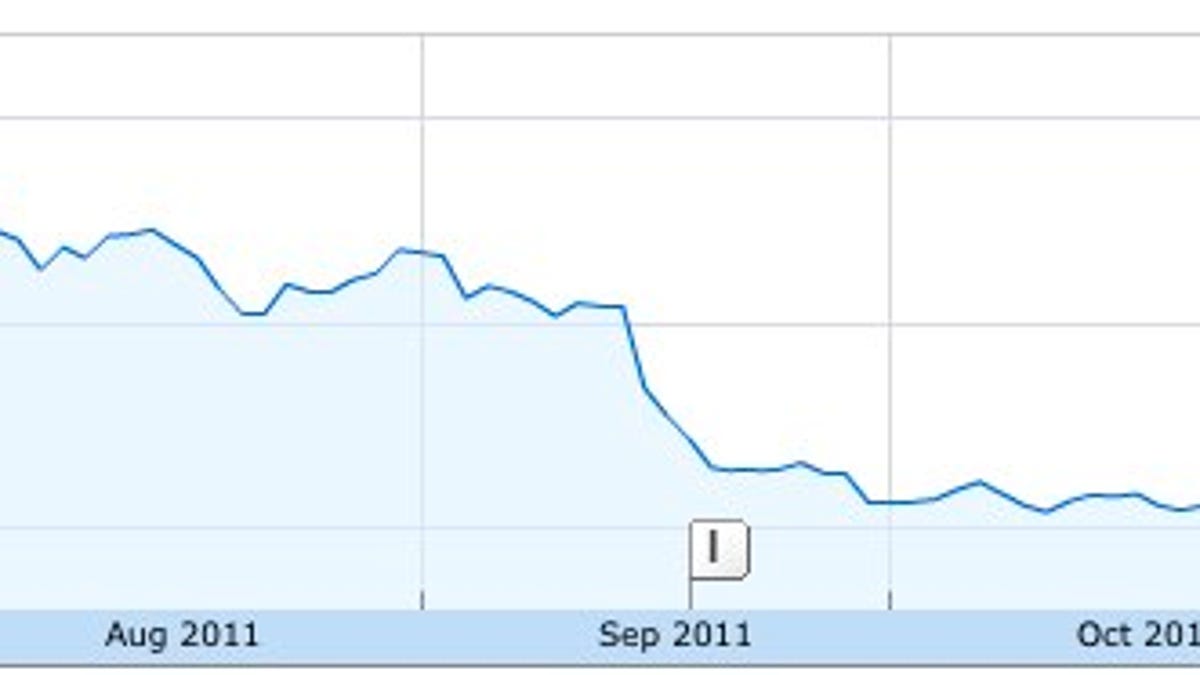How low can Netflix's stock go? Much lower, analysts say
Netflix's stock hit a 2011 low on Tuesday and is trading lower today. Some analysts say that will only continue in the coming quarters.

Netflix investors might be wondering how much lower the stock can go before it levels off. Unfortunately for them, a few analysts think it could get much, much worse.
Yesterday, Netflix shares closed the day at $70.45, the stock's worst closing price this year. At one point during the day, Netflix's shares fell all the way to $69 before turning around.
The sell-off was due mainly to the company's announcement on Monday that it's having a cash flow issue and has been forced to raise $400 million. Half of that has been raised in a registered sale of stock to T. Rowe Price Associates, while the remaining $200 million comes by way of "private placement of convertible notes."
The cash flow issue is quite troublesome. As Wedbush analyst Michael Pachter wrote in note to investors yesterday, "Netflix ended the third quarter with $366 million of cash and short-term investments, significantly less than the amounts owed by the company for streaming rights." But just how much less? According to Pachter, the company's short- and long-term liabilities "totaled roughly twelve times cash and short-term investments at the end of the third quarter."
It gets worse. Netflix has also announced that it now expects to post a loss in its 2012 fiscal year, shocking analysts who expected a profit for the period.
"If we are unable to repair the damage to our brand and reverse negative subscriber growth, our business, results of operations, including cash flows, and financial condition will continue to be adversely affected," Netflix wrote recently in a Securities and Exchange Commission filing.
Considering that, and due to concerns with the volatility in Netflix shares, Pachter has turned bearish on the streaming provider, dropping the stock's 12-month price target from $82.50 to $45.
"As Netflix's wounds are self-inflicted, it is exceedingly difficult to determine when, if ever, management will sacrifice growth at any cost and return to a path of profitability," Pachter wrote to investors. "Without a clear statement of strategy or some indication of a path to allow a return to profitability, we find ourselves pulling numbers from thin air."
But Pachter isn't alone. Analysts at Canaccord yesterday gave Netflix a "sell" rating and a price target of $60. Morgan Stanley also dropped its price target for Netflix, but it's more bullish on the stock, saying that it now believes the streaming company will jump to $80 per share within the next 12 months.
Netflix hasn't seen a rising stock price for months. In the last month alone, Netflix shares have dropped 41 percent. Stretching out to three months, the company's stock is down 69 percent. Since January 1, Netflix is down 61 percent. At one point earlier this year, Netflix was trading at more than $300 per share. As of this writing, it's at $69.85.
Worst of all, Netflix just doesn't know if it can turn things around. Since the stock's precipitous decline that started with its announcement of higher prices for customers who want to stream content and rent DVDs, followed by its ill-fated Qwikster spinoff plan, Netflix has been totally unable to instill confidence in investors. It also didn't help that during the third quarter, the company lost 810,000 subscribers.
What's more, Netflix's plans to expand into Europe early next year, while potentially beneficial for its revenue figures, are being criticized by some analysts who say that it will make the company's expenses rise too quickly and keep it in poor financial shape.
"There has been no assurance that a return to profitability would occur in 2013; instead, management appears focused on growth at any cost, and appears to have abandoned the operating margin expansion strategy it practiced in 2007-2011," Pachter wrote to investors.
Simply put, Netflix seems to be pushing all the wrong buttons as of late. And the sell-off seems to indicate shareholders don't believe the company can turn things around.
Netflix declined CNET's request for comment on its ailing stock.

